All trips are run by volunteers who know the site, and everyone on the trip can participate in spotting and identifying the plants.
Unless noted otherwise, trips start at 10 AM. Unless noted otherwise, trips are free and open to the public.
Please feel free to provide feedback or comments that may enhance our offerings: philbotclub@gmail.com
Field trip leaders can download instructions for trip reports.
Current Field Trips & Workshops:
April 13, 2025
Plants and Fungi at Morris Park, Philadelphia

This trip to Morris Park is sponsored jointly by the Philadelphia Botanical Club and the Philadelphia Mycology Club. We will explore the forest along the east branch of Indian Creek, focusing on the plants and fungi.
Registration (and additional info):
Please register for this trip using the link below.
Directions/Logistics:
Meet at 10:00 a.m. at the Morris Park trailhead, just southwest of the corner of Sherwood Rd. and N. 66th St. in the Overbrook section of Philadelphia. The site is accessible via SEPTA and street Parking is available nearby.
Leaders:
This trip is led by members of the Philadelphia Mycology Club and Philadelphia Botanical Club.
Registration is closed for this event.
April 19, 2025
Great Marsh, Elverson, PA
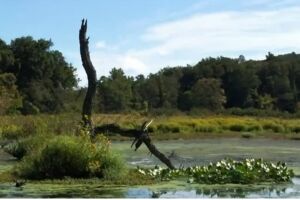
The Great Marsh is the largest almost fully intact inland marsh in our region. It makes up the core of a 700-acre wetland complex of floodplain forest that extends to the reservoir at Marsh creek State Park. The Great Marsh has been identified as an Important Wetland by the U.S. Environmental Protection Agency. The Great Marsh holds numerous types of wetland plant communities.
Join Janet Novak and Great Marsh Institute Executive Director Bernard “Billy” Brown on a survey of the marsh, Marsh Creek, and an associated upland forest.
Given the varied terrain, participants should consider waterproof footwear for the marsh and a walking stick for the upland area.
Registration (and additional info):
Please register for this trip using the link below.
Directions/Logistics:
Navigate to 34 Moores Rd., Elverson, PA 19520. After you turn from Rte. 401 onto Moore’s Rd., follow the road over an embankment across the marsh and then take the first right turn (a driveway) up the hill around a large stone house. Park in the grassy area opposite the stone house.
Leaders:
This trip is led by Janet Novak and Bernard “Billy” Brown.
For questions about this field trip, including registration, please contact the club at philbotclub@gmail.com
Friday, April 25, 2025, 10:00 a.m.
Field Trip to Temple Ambler Research Forest and Talk by Ken Frank
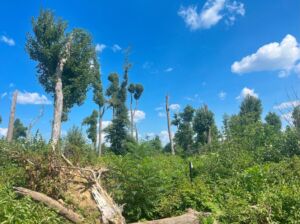
On Friday, April 25, the Philadelphia Botanical Club is joining the Temple Ambler Field Station for a series of events, including a tour of the Temple Forest Observatory, a talk on the spotted lanternfly by Ken Frank, and a student poster session showcasing research by undergraduates. Participants are invited to attend all or part of the day’s sessions.
The tour of the Temple Forest Observatory begins at 10:00. Meet here: Ambler Research and Collaboration Building.
Ken Frank’s talk, “Community Science Reveals Hidden Impact of the Spotted Lanternfly” takes place at 1:00 at the Ambler Learning Center, Rooms 202 & 203 (on the 2nd floor).
Registration (and additional info):
Please visit our Field Trips & Workshops page to register for this event or other upcoming field trips: Field Trips 2025
Directions/Logistics:
See the links below for directions to parking areas. Visitors are required fill out a form to register to park (free of charge). Click here for the Parking Application.
Parking Locations: Park in Lot 1 on Meetinghouse Rd. or Lot 3. Enter campus at the main entrance across from the parking lot exit.
Leaders:
Lost or need more information? Contact Mariana (Managing Director) if you have any problems. Email: mariana.bonfim@temple.edu or call/ text her Field Station number at 267-282-1435.
For questions about this field trip, including registration, please contact the club at philbotclub@gmail.com
May 17, 2025
Croyden Woods, Bucks County, PA
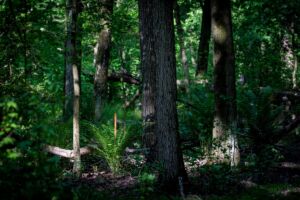
Croydon Woods, an 80 acre preserve in Southern Bucks County, is owned and managed by Heritage Conservancy. It is a remnant coastal plain forest that was once a Superfund site. Since Heritage Conservancy acquired the property and turned it into a community asset, multiple state listed plant species have been identified. There is a diversity of habitats, including magnolia swamps, powerline cuts, and forests with at least 8 Quercus species.
A few species of interest include Netted chain fern (Woodwardia areolata), Sweetbay magnolia (Magnolia virginiana), Umbrella magnolia (Magnolia tripetala), Swamp dog hobble (Eubotrys racemosa), and Cranefly orchid (Tipularia discolor).
Field trip observations will help support Heritage Conservancy’s plant conservation program. For more information about Croydon Woods Preserve, visit Heritage Conservancy
Registration (and additional info):
Please register for this trip using the link below.
Directions/Logistics:
Parking is located next to the ballfields near Keystone elementary school. We will meet at the outdoor classroom next to the trailhead.
Here is a link to the meeting place:
Leaders:
This trip is led by Andrew Conboy and Tyler Kovacs, Senior Conservation Biologist at Heritage Conservancy.
For questions about this field trip, including registration, please contact the club at philbotclub@gmail.com
June 9-12, 2025
Joint Field Meeting of the Botanical Society of America, the NE Section of Torrey Botanical Society, & Phila. Botanical Club
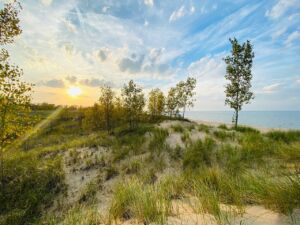
Each year the Botanical Society of America, the Torrey Botanical Society, and the
Philadelphia Botanical Club sponsor a field meeting in an area of northeastern North
America. The 2025 meeting will be held in and around the Indiana Sand Dunes in
northwestern Indiana. Lodging will be at the Spring House Inn in Chesterton, Indiana.The Indiana Dunes, shaped by Lake Michigan over thousands of years, consist of many
habitats along 15 miles of coastline. Indiana Dunes National Park is home to around 1,100
vascular plants, which includes 30% of Indiana’s listed plant species.
The event will run from Monday June 9, 2025 (arrive at Spring House Inn for registration,
dinner and evening program) to Thursday June 12, 2024 (breakfast and depart for home).
Check in is at 3:00 pm on Monday and check out is by 11:00 on Thursday.Registration (and additional info):
The registration form is available here:
Joint Meeting Indiana Dunes Registration
Registration forms must be received by U.S. mail by April 18.
Field Trips:
While exact field trip locations are still being finalized, some potential trips could include
Pinhook Bog, Amber Flatwoods Nature Preserve, Tolleston Dunes, and Moraine Nature
Preserve. To limit our impact on sensitive environments, we will split into two groups each
day and alternate sites with field trip leaders.
Speakers:
Each evening after dinner there will be a presentation. These are still to be determined.
Lodging:
Spring House Inn is a rustic and quaint hotel in the woods, two miles from the entrance to
Indiana Dunes State Park and a five-minute drive from Indiana Dunes National Park. They
offer a fitness center, pool, sauna, and 24-hour service at the front desk.Spring House Inn, 303 North Mineral Springs Road
Chesterton, Indiana 46304
Meals:
The Spring House Inn offers a self-serve breakfast buffet each morning from 7:00-10:00.
Dinner each evening will be at the Spa Special Events Center, next door to the inn. We will
pick up our lunches and fill our water bottles for the day at the Events Center after breakfast.
Fees:
Speakers, field trips, meals, and SINGLE room lodging $600.00/person
Speakers, field trips, meals, and DOUBLE room lodging $400.00/personThere is a $15 additional fee/person for attendees who are not members of the Botanical Society of
America. This $15 fee will be donated to BSA on your behalf. Alternatively, we suggest everyone join
this fine organization.For questions about this field trip, including registration, please contact the club at philbotclub@gmail.com
Past Field Trips & Workshops:
Sunday, December 8, 2024 at 10:00 a.m.
Black Run Preserve, Burlington County, N.J.
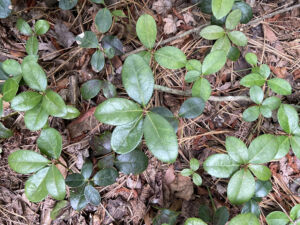 Black Run, a 1,300-acre preserve, offers good pine barrens habitats only 20 miles from Philadelphia. The preserve contains ponds, bogs, pitch pine uplands, and pitch pine lowlands. We’ll be aiming to see the classic pine barrens plants, such as turkey beard (Xerophyllum asphodeloides), sundews (Drosera spp.), meadow beauty (Rhexia), sweet pepperbush (Clethra alnifolia), a range of ericaceous shrubs, and, of course, pitch
Black Run, a 1,300-acre preserve, offers good pine barrens habitats only 20 miles from Philadelphia. The preserve contains ponds, bogs, pitch pine uplands, and pitch pine lowlands. We’ll be aiming to see the classic pine barrens plants, such as turkey beard (Xerophyllum asphodeloides), sundews (Drosera spp.), meadow beauty (Rhexia), sweet pepperbush (Clethra alnifolia), a range of ericaceous shrubs, and, of course, pitch 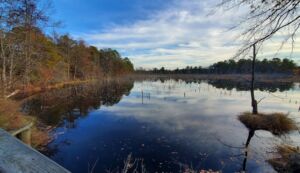 pine (Pinus rigida). More information on the Black Run preserve can be found at https://blackrun.org. The trip should end by 2:00 PM. The trip will be postponed until December 15 if there is more than an inch of snow on the ground or steady rain in the forecast. Any postponement will be posted on the website by 7 PM on December 6 and emailed to those who are registered.
pine (Pinus rigida). More information on the Black Run preserve can be found at https://blackrun.org. The trip should end by 2:00 PM. The trip will be postponed until December 15 if there is more than an inch of snow on the ground or steady rain in the forecast. Any postponement will be posted on the website by 7 PM on December 6 and emailed to those who are registered.Directions/Logistics:
Meet in the Black Run Preserve Trailhead parking lot on Kettle Run Road in Evesham. This is at coordinates 39.8460 -74.8991, on the east side of Kettle Run Road around 1/10 mile south of its intersection with Braddock Mill Road. (Here is a link to the meeting location: Black Run Trailhead
Note that there is also a parking lot on the west side of the road, so be sure you pick the one on the east side, which is marked by a wooden sign that says “Black Run Preserve” and a smaller white sign, “Kettle Run Road East Trailhead.”
Carpooling: If you need a ride, contact the trip leader, who can pick up people in or near northwest Philadelphia or at 30th Street Station; other locations may also be possible.
Leaders:
Janet Novak, botany@indri.org or 215-534-6700
Ignore the message below: Registration is open.
Registration is closed for this event.
September 8 (Sunday) at 9:00 AM
Suburban Botany, Woodbury, Gloucester County, New Jersey
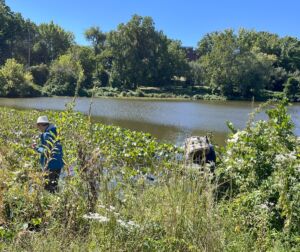
There are plants that grow out of sidewalk cracks, in neglected mulch beds, and other apparently degraded habitats. Some are native, some have been in New Jersey for centuries, and some are recent arrivals. You won’t find many of them in fields and forests but they are still part of the ecosystem though often overlooked. We will see how many species we can find around the perimeter of the meeting place and the brushy edges of adjacent Broad Street Lake. Trip should be over by lunchtime, but if time and energy permit a postprandial extension is not impossible.
Directions/Logistics:
The meeting place and trip location is the parking lot at the intersection of Broad Street and Red Bank Avenue in Woodbury (behind the McDonald’s). Meet at 9:00 AM. Gather at the southeast corner of the lot (to the right of the CVS). Avoid parking directly in front of the store. For more information email leader. Heavy rain cancels; rain date is Sunday September 15. Contact leader if uncertain.
Leaders:
Karl Anderson, karlanderson6@aol.com
Registration is closed for this event.
August 10 (Saturday) at 10 AM
Abbot Marshlands, Mercer Co., New Jersey
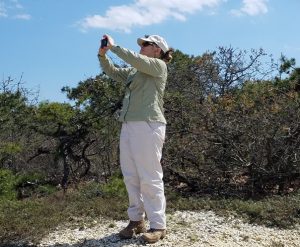
Wetland plants of the northern-most freshwater tidal marsh of the Delaware River should be in full display for our visit to the Abbott Marshlands. In the morning, we will examine common wetland species in and around a human constructed lake as well as at the edge of the marsh. A multiyear project to reduce Phragmites in the marsh has opened up new areas for plant colonization. After lunch, depending on the interests of the group, we’ll choose another area of the marshlands to explore. Bring lunch and beverage; insect repellent is not usually needed, but feel free to use it. Be prepared for wet walking.
Directions/Logistics:
Meet at Spring Lake at 10 AM, Roebling Park, Hamilton, NJ. (from South Broad St. (NJ Rt 206), turn onto Sewell Ave., at the end, turn left and drive down the hill to the parking lot). Cosponsors: Friends for the Abbott Marshlands and Mercer County Park Commission.
Leaders:
Pat Coleman, 609-977-9573. Cosponsors: Friends for the Abbott Marshlands and Mercer County Park Commission.
Registration is closed for this event.
July 31 (Wednesday) at 10:30 AM
Penrose Swamp/oak/pine barrens, Carbon Co., PA
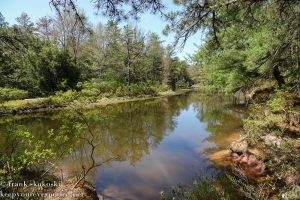
At the center of a newly protected 2,700-acre (> 4 sq. miles!) tract of land owned and managed by the PA Bureau of Forestry, near Hazleton and Weatherly, is roughly 100 acres of mesic scrub oak-heath-pitch pine barrens containing a dense stand of Lygodium palmatum, American climbing fern, likely the largest colony of its kind in the northeast US, or even world-wide. Areas of it are so thick that it gives the effect of walking on a trampoline (which, of course, we will not do!) Other interesting plants include fly-poison (Amianthium muscitoxicum), sheep-laurel (Kalmia angustifolia), black-fruited rice grass (Patis racemosa), roundleaf sundew (Drosera rotundifolia), and other characteristic species characteristic of Pocono plateau barrens and forest. We hope to make new discoveries, possibly including several rare orchids known to occur elsewhere in the Hazleton area. Penrose also is renowned locally as habitat for black bear, deer, grouse, turkey, waterfowl and migratory songbirds. Hazle Creek, 10-15 ft wide, meanders through the northern and middle sections of the tract.
Registration (and additional info):
REGISTRATION IS REQUIRED. Email the club at philbotclub@gmail.com and indicate the type of vehicle you will be driving and, if possible, how many additional folks it can accommodate. Please register by July 26th so that proper arrangements can be made. Also, indicate if you intend to camp at Hickory Run SP or another local site. It will be midweek, so hopefully the park will not be too crowded, but there may be construction related work stoppage on I 80 heading west toward Penrose, so you may need to budget additional time if you intend to do this. Unfortunately, access across the Lehigh River at this point in E/W travel is very limited and there are few other camping spots or motels west of the Lehigh River available. You could check the Hazleton area online.
Special Instructions:
Bring a lunch, water and waterproof boots or footwear that can get wet. Insect repellent, binoculars and a hand lens recommended. If you are interested in camping at Hickory Run State Park either the day before, or the day afterward, please indicate this at registration.
Directions/Logistics:
We will meet at 10:30 at the parking lot of the old Weatherly train station (40.941719, -75.829150) and carpool to the site. Cars going on to the site need to be 4WD, all-wheel drive, or high-clearance. Exit the PA Turnpike NE Extension (I-476) at Mahoning Valley (exit 74), take U.S. 209 south 9 miles, turn right on PA 93 north, in 6 miles turn right onto Brenkman Dr., and drive 2 miles to downtown Weatherly.
Leaders:
Mike Gondell (cell: 570 926-2535), Tim Block and Ray Youngblood, Roger Latham
Registration is closed for this event.
July 13-14 (Saturday and Sunday) at 10 AM
Ricketts Glen State Park, Luzerne and Sullivan Counties, PA

Ricketts Glen State Park is one of the most scenic areas in Pennsylvania. The park includes 13,193 acres in Luzerne, Sullivan, and Columbia counties. The park includes the Glens Natural Area, which is a National Natural Landmark. Quoting the park website:
“Hike the Falls Trail System to explore the glens, which boasts a series of wild, free-flowing waterfalls, each cascading through rock-strewn clefts in this ancient hillside. The 94-foot Ganoga Falls is the highest of 22 named waterfalls. Old growth timber and diverse wildlife add to the beauty.”
We’ll keep an eye out for the peak blooms of many summer-blooming plants. Dr. George P. Chamuris has put together a very useful flower phenology guide for the flora of RGSP. We will also try to track down Polystichum braunii (Braun’s Holly Fern), a northern species that is listed as endangered in PA, and apparently found in a small population near or within the park. Bring good hiking shoes, rain gear, insect repellent, food and water. A compass and cell phone would be good, but don’t wander too far from the group. We do not want to have to helicopter anyone out!!
Registration (and additional info):
To register,click on this link:
(We will never share your email address).
Special Instructions:
If you’d like to be kept up to date on developments for this trip, please email David at DML1000@comcast.net. Don’t be shy.
Lodging:
As of late July, there are a few tent sites available in the park for the night of July 13th. If you are planning to stay in a tent on either Friday or Saturday nights, The leaders recommends reserving a site as soon as possible. Another option is the Ricketts Glen Hotel, located close by.
Directions/Logistics:
We will meet at 10 AM at the park office on both days. GPS location: 41.33635 -76.30265.
Leaders:
Andrew Conboy
Registration is closed for this event.
June 3-7, 2024 (Monday to Friday)
Joint Field Meeting (BotSoc), Bruce Peninsula, Ontario, Canada
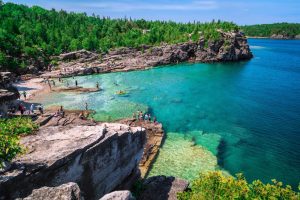
Each year the Botanical Society of America NE section, the Torrey Botanical Society, and the Philadelphia Botanical Club sponsor a field meeting in eastern North America. The 2024 meeting will finally return (after delays due to Covid) to the Bruce Peninsula, Ontario and will be housed at the Evergreen Resort.
Registration (and additional info):
Download in PDF or Word format. The registration deadline is April 12.
Field Trips:
We will visit a number of fascinating areas and habitats, including alvars, sandy shorelines, marl fens, upland forest, forested dunes, marshland, and rocky forest. Just a few of the species highlights we expect to see are ram’s head lady slipper, sticky tofieldia, dwarf lake iris, lakeside daisy, butterwort, Hooker’s orchid, rare ferns, seaside arrowgrass, buckbean, paintbrush, tamarack, and bladderworts. Field trips are being organized and led by Walter Muma and Tyler Miller. Both are experienced field botanists with a focus on the Bruce Peninsula.
Speakers:
Evening presentations will include orchids of Grey-Bruce, parasitic and carnivorous plants of the Bruce, and more. These will be presented by Walter Muma, Tyler Miller, and others. Tuesday evening will feature “Orchid Quest,” by Willy and Audrey Waterton, about their two-year quest to find and photograph all of the orchid species of Bruce and Grey Counties. The resultant book, Orchids of Grey-Bruce, will be available for purchase at this entertaining and informative presentation.
Lodging:
Housing will be at Evergreen Resort. Cabins include all bedding linens and towels, and daily housekeeping. Evergreen is a rustic resort with the atmosphere of the 1930’s. It is one of the long-standing “family” lodges located along the Lake Huron shoreline at the base of the Bruce Peninsula. The owners, the Bennett family, have always worked to maintain a natural setting as possible and to focus on the surrounding natural history.
Meals:
Breakfasts and dinners will be served at Evergreen Resort. Lunch is box-style and will be picked up at breakfast each day.
Registration is closed for this event.
Saturday, April 20, 2024 (Rain date: Saturday, May 18th)
Pink Hill Serpentine Barrens, Tyler Arboretum, Delaware Co, PA
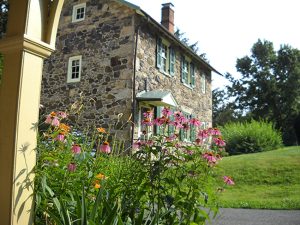
Meeting time 10 AM. Please arrive by 9:40 if you’re not a Tyler Arboretum member to pay for admission in time for the walk.
The Pink Hill Barrens are a model for stewardship: it is the only serpentine barren inside a deer exclosure fence; it includes the largest recent, highly successful serpentine grassland restoration–7 acres restored from encroaching forest; and it is the impetus for Tyler’s escalation of its prescribed fire program to burn somewhere every year (we will see the aftermath of this spring’s fire). There are populations of 19 plant species ranked as endangered, threatened, near threatened (“rare”), or that are watch-listed in the state. The site is historic: it was fire-maintained for centuries by the Lenape and for millennia by their predecessors; in the 1890s-1900s UPenn botany professor John Harshberger took his students there on field trips and focused a 1903 paper on it in Science. Tyler Arboretum has been a pioneer in the use of fire for biodiversity conservation; it began burning at Pink Hill in the 1970s, perhaps at the urging of Dr. Wherry. Besides 100 acres of display plantings, meadows, and mature forest inside the main deer fence, there are 550 acres of forest and meadows to explore, with healthy stands of native forest-floor plants, a Native American pictograph (“Indian Rock”), pristine small streams with boulders and cascades, and historic buildings and ruins from the colonial period. Attendees could pack a lunch and may explore on their own after the field trip.
Directions/Logistics:
Meet in the Tyler parking lot, 515 Painter Road, Media, PA, next to the visitor center (39.934701, -75.441573). To get to Pink Hill we have special permission to walk, as a group, a mile through the arboretum’s collections (past the 168-year-old Sequoiadendron) and forest, partly on a trail that has been closed for dead ash removal and is not yet open to the general public. Don’t be late or you might be left behind! Wear hiking footwear and spray against chiggers and ticks.
Fees:
Tyler has a daily entrance fee for nonmembers: adults (ages 18-64) $18; seniors (65+) $15; young people (ages 3-17), military, and students with valid ID $10. Pay at the visitor center or become a member beforehand online (tylerarboretum.org/membership).
Leaders:
Roger Latham, (REL@continentalconservation.us)
Registration is closed for this event.


